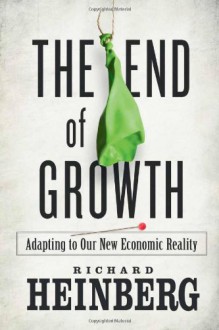The End of Growth: Adapting to Our New Economic Reality
Economists insist that recovery is at hand, yet unemployment remains high, real estate values continue to sink, and governments stagger under record deficits. The End of Growth proposes a startling diagnosis: humanity has reached a fundamental turning point in its economic history. The...
show more
Economists insist that recovery is at hand, yet unemployment remains high, real estate values continue to sink, and governments stagger under record deficits. The End of Growth proposes a startling diagnosis: humanity has reached a fundamental turning point in its economic history. The expansionary trajectory of industrial civilization is colliding with non-negotiable natural limits. Richard Heinberg’s latest landmark work goes to the heart of the ongoing financial crisis, explaining how and why it occurred, and what we must do to avert the worst potential outcomes. Written in an engaging, highly readable style, it shows why growth is being blocked by three factors: Resource depletion Environmental impacts Crushing levels of debt These converging limits will force us to re-evaluate cherished economic theories and to reinvent money and commerce. The End of Growth describes what policy makers, communities, and families can do to build a new economy that operates within Earth’s budget of energy and resources. We can thrive during the transition if we set goals that promote human and environmental well-being, rather than continuing to pursue the now-unattainable prize of ever-expanding GDP. Richard Heinberg is the author of nine previous books, including The Party's Over, Peak Everything, and Blackout. A senior fellow of the Post Carbon Institute, Heinberg is one of the world's foremost peak oil educators and an effective communicator of the urgent need to transition away from fossil fuels.
show less
Format: paperback
ISBN:
9780865716957 (0865716951)
Publish date: August 9th 2011
Publisher: New Society Publishers
Pages no: 336
Edition language: English

The title of the book states its content. The Club of Rome wrote on the limits of growth; now, Heinberg argues, we've reached them. Our economic system is based on continual growth of the GDP. If that growth is driven by cheap energy, and cheap energy is at an end as easily accessible carbon fuel so...

I am torn about this book. It was a bit of a downer pretty much the whole way through. I liked that it touched on the financial markets, but not really in any depth. The same could be said for the entire book. I felt like "Limits to Growth" was a better argument for the end of growth concept, an...






 13 years ago
13 years ago